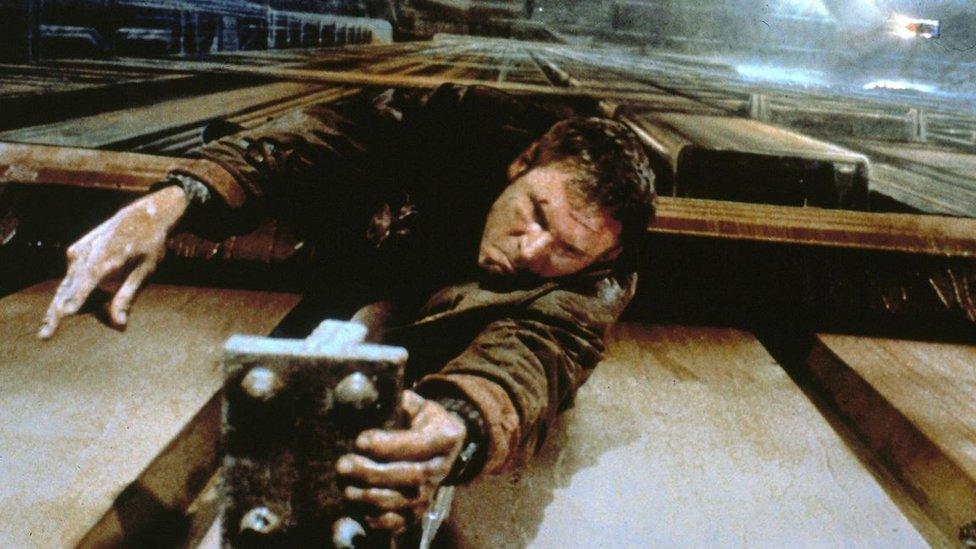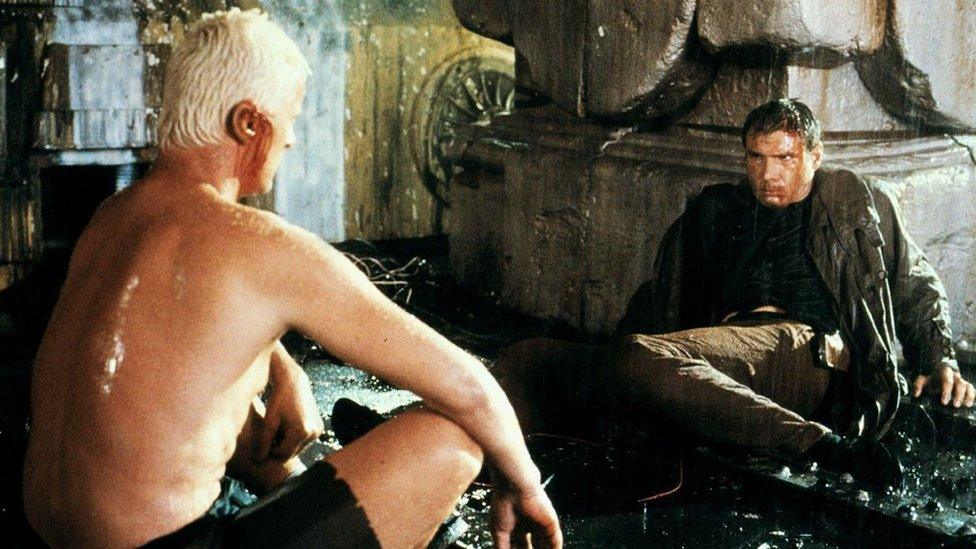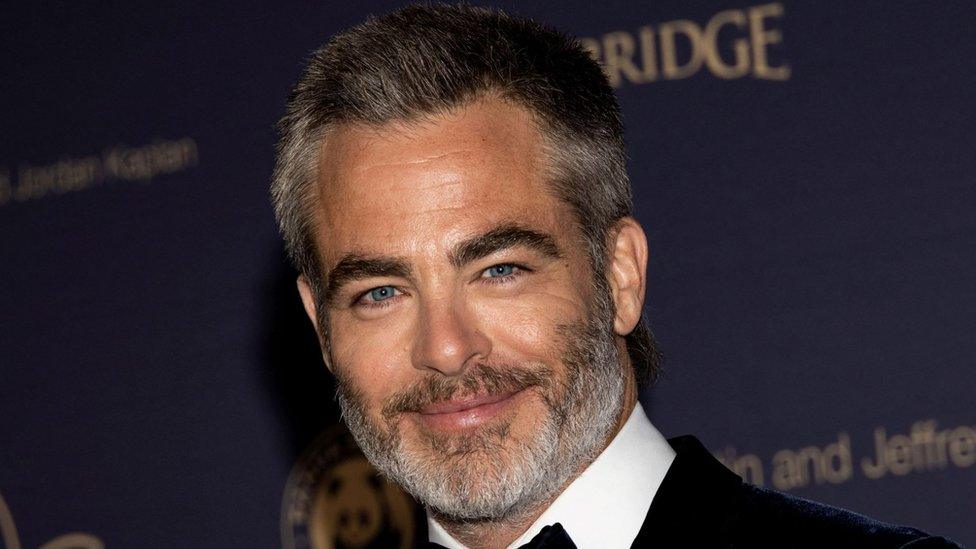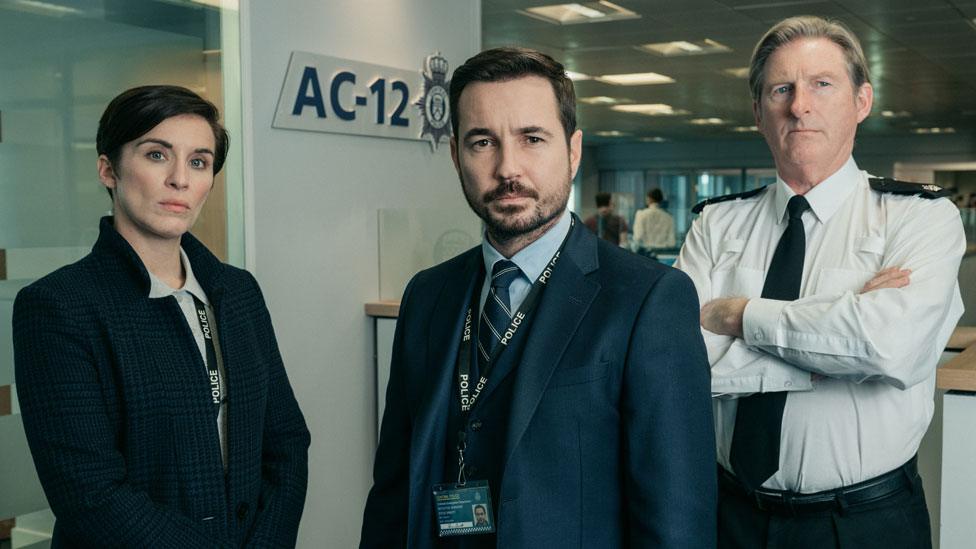NI Screen: Blade Runner 2099 to be filmed in Northern Ireland
- Published

Blade Runner 2099, a TV series based on the iconic Blade Runner films, will be filmed in Northern Ireland
Blade Runner 2099, a TV series based on the iconic Blade Runner films, is to be filmed in Northern Ireland.
The series has been commissioned by the streaming giant Amazon with Ridley Scott, who directed the original 1982 Blade Runner film, as executive producer.
Northern Ireland Screen chief executive Richard Williams made the announcement on Tuesday.
He said pre-production would start almost immediately.
Filming is due to begin in spring 2023.
"Most people are familiar with Blade Runner, this is a television series in that world," he said.
"It'll be big, it'll be very big."
Alcon Entertainment, who made the 2017 feature film sequel Blade Runner 2049 starring Ryan Gosling and Harrison Ford, are behind the TV series.
The first Blade Runner film has become one of the most iconic science fiction films of all time.
Starring Harrison Ford, Rutger Hauer, Sean Young and Darryl Hannah, it told the tale of a police officer whose job was to hunt down synthetic humans - or replicants - in a dystopian Los Angeles.

It has influenced many other films and popular culture, as well as predicting developments in technology and climate change.
It is not yet known who will star in the new TV series, which is set 50 years after the action of the 2017 sequel.
'Ambitious' target for four-year strategy
The announcement was made as Northern Ireland Screen's new 2022-2026 strategy outlined that the TV, film and video game industries should aim to generate more than £430m for the Northern Ireland economy over the next four years.
It plans to spend about £53m on TV, film and video game production until 2026 to generate an "ambitious and challenging" £431m return.
But there is less money for Irish language and Ulster-Scots broadcasting this year compared to 2021/22.
Northern Ireland (NI) Screen said that was due to the end of "an uplift in funding in 2021/22 following the implementation of commitments within New Decade New Approach".
New Decade New Approach (NDNA) was the agreement which restored the Northern Ireland Executive in January 2020.
It included a government commitment to increase funding to the Ulster Scots Broadcast Fund and Irish Language Broadcast Fund.
That "one-off uplift" was provided by the UK's Department for Digital, Culture, Media and Sport (DCMS).

Paramount's Dungeons & Dragons, starring Chris Pine, was filmed in Northern Ireland
However, NI Screen's business plan for 2022/23 said "the uplift in funding is not to be sustained in 22/23 and future years".
"A one-year increase in production funding is challenging to manage as it increases demand for the funding from the production companies which cannot be met in future years," it said.
"The reduction in funding from DCMS will impact the number of projects that can be supported and the number of training places and skills development that can be supported in 2022-23."
There will be about £3.9m available for the Irish Language Broadcast Fund in 2022/23 and about £1m for the Ulster Scots Broadcast Fund.
That will fund a number of things including 60 hours of television in Irish, 10 hours of television and some radio in Ulster-Scots and employment for a number of trainees through both funds.
Richard Williams, the chief executive of NI Screen, told BBC's Good Morning Ulster there was no reason the creative industries could not sustain growth in the coming years but added that he was very disappointed by the reduction in Irish and Ulster-Scots language funding.
New targets after previous success
NI Screen's 2022/23 business plan covers the first year of the body's new strategy for 2022-26, called Stories, Skills & Sustainability.
The previous strategy from 2018-2022 included plans to grow the television drama, independent film and animation industries and to increase the number of video game companies.
For instance, NI Screen spent about £300,000 per year on video game production funding until 2022.
The 2018-22 strategy also included an overall target to deliver a minimum of £300m return to the Northern Ireland economy from the screen industries over that period.
NI Screen said that target had been exceeded and so it had been increased for the new 2022-26 strategy.

Line of Duty was among a recent run of successful TV productions filmed in Belfast
"The strategy includes an uplifted economic spend target of £430 million, a 43% increase on the £300 million target for Opening Doors 2018-22," the business plan said.
The Department for the Economy (DfE) provides the majority of NI Screen's income and has increased its funding to almost £18m in 2022-23.
NI Screen's total budget for 2022/23 is about £27m.
Mr Williams praised early efforts made by former first and deputy first ministers Peter Robinson and Martin McGuinness in developing the film industry in Northern Ireland, but added that recent governments have "not delivered to the same extent".
"Would it be more impactful, particularly in the American market, if there was the joined-up leadership that there had been in the past? Yes it would," he added.
'Confident' work will come in
Among the recent productions filmed in Northern Ireland which NI Screen has invested money in are Paramount's Dungeons & Dragons, starring Hugh Grant and Chris Pine, and Netflix's The School for Good and Evil, featuring Charlize Theron and Kerry Washington.
Major TV series recently shot in Northern Ireland include Bloodlands and Line of Duty.
Plans have also been unveiled for Studio Ulster - a £25m cutting-edge virtual production studio to be built in Belfast by 2024.
However, in June a major television series from Star Wars director JJ Abrams, which was due to film in Belfast, was cancelled.
Mr Williams said he understands the pressures freelance workers are feeling and that a new project will be announced "within a matter of days", adding he was not in a position to provide further details.
"I am extremely confident that we will have projects to fill both Titanic Studios and Belfast Harbour Studios. Unfortunately I don't have full control on the information that underpins that," he said.
"The work absolutely will come in… we continue to get the support of the Northern Ireland Executive, which gives us the tools and allows us to develop the physical infrastructure, provide the modest incentives and to develop the crew that will allow us to continue to bring the work."
NI Screen's 2022-26 strategy also includes plans to give about 100 people training and placements in the film and TV industry.
The Creative Industries New Entrants programme is funded by the Department for Communities and run by NI Screen in partnership with BBC Northern Ireland.
It will target opportunities to those least likely to enter the industry including to those with a disability, from an ethnic minority or from a lower socio-economic background.
Related topics
- Published20 September 2022

- Published25 January 2021

- Published19 November 2019

- Published4 October 2018
